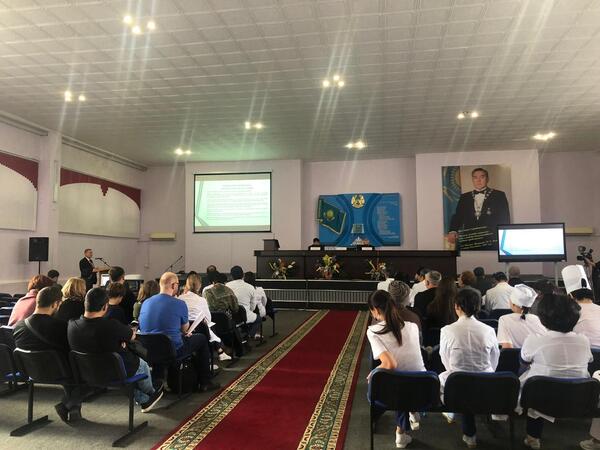October 18, 2019 on the basis of the psge "Regional center of traumatology and orthopedics named. H. Z. makazhanova (hereinafter Octio them. H. Z. makazhanova) for health workers in Karaganda region in accordance with the task of implementing the roadmap to improve transplant service in Kazakhstan to 2019 – 2020 has hosted a regional meeting and educational seminar on the topic: "Questions transplant coordination and development of post-mortem organ donation in the Republic of Kazakhstan".
the Seminar was organized by the Ministry of health of the Republic of Kazakhstan as part of the educational project "Development of organ donation and transplantation in Kazakhstan. Transplant coordination".
In accordance with international practice, for the development of organ donation and transplantation programs in developed countries, continuous training of practical health professionals is widely practiced, including managers, anesthesiologists, resuscitators, neurologists, neurosurgeons, nephrologists, pathologists, psychologists, lawyers, and other specialists.
< p align="justify">the Specifics of Transplantology, as a multidisciplinary field, require effective interaction and integration of doctors of many specialties, especially specialists of intensive care units, neurology, neurosurgery, Transplantology, immunology, as well as a whole army of specialists of paraclinical units. In addition, they can not do without interaction with specialists of other departments and services. In this regard, great importance is given to the transplant coordination service as a regulatory link in the technological link "intensive care unit - transplant center".The level of medical development in the country today allows us to provide our citizens with high-tech services in the field of "organ and tissue transplantation". In the cities of national significance Astana, Almaty and Shymkent, as well as in some major regional centers of the Republic, there are specialized centers and clinics that perform organ and tissue transplantation, for example, in the Aktobe region (Aktobe medical center). Highly professional specialists involved in organ and tissue transplantation have been trained in well-known clinics around the world. The state fully finances the costs of transplantation operations and subsequent rehabilitation of recipients. Every year, the number of donor organ transplants performed increases, both from close relatives and from post - mortem donors-patients with irreversible brain death.
Statistics for Karaganda region
in the "waiting lists", the number of people in need of organ transplantation in the Karaganda region is 280 (out of 2893 in the country), which is 9.67%. for comparison, Akmola residents make up 2.8%. Among 280 people in need, 4 are children. There are 11 people waiting for a heart transplant and 4 people waiting for a liver transplant.
Residents of Karaganda region received organ transplants in 74 patients, including heart -3 (1-child), liver-9, kidneys-62 (including 10 children). From a posthumous donor ("cadavera"), the transplant was performed in 15 patients. At the same time, work on multi-organ organ harvesting from a cadaverous donor in the region was not carried out at all.
in the General structure of those in need, the 1st place in the "waiting list" for a transplant is traditionally occupied by patients with kidney diseases (90.0%), followed by patients with liver diseases (7.5%) and patients with heart disease (2.5%).
Transplant organizations in Karaganda region
the transplant coordination Service in the region has been developing since 2012, THE rcctvmu representative office was opened in Karaganda. Its staff is staffed by part-time doctors from the General medical network: resuscitators, neurologists and neurosurgeons.
The List of medical organizations approved as "donor hospitals" in the region, along with the KGB Otstio named after H. Zh. makazhanov, included the KGB "Central city hospital of Temirtau" and the KGB "Central city hospital of Dzhezkazgan".unfortunately, the existing objective difficulties did not allow us to organize the dynamic functioning of donor hospitals in the region. References by individual health care providers to existing, allegedly, barriers due to religious reasons or national traditions-do not have any grounds. It should be emphasized that in countries such as Turkey and Pakistan, transplantation, including post - mortem donation, is developing very successfully, and a purely Muslim country such as the Islamic Republic of Iran is one of the world leaders in the organization of life-long and post-mortem donation. This is confirmed by the positive dynamics in this area and in certain regions of the country. So, as a "successful experience", we can cite the work of the "donor hospital" of the Akmola region-KGP on the PCV "Multidisciplinary regional hospital No. 2", which was included in this list in 2018 and managed to dynamically and successfully, with increasing momentum, begin to function in the field of post-mortem donation (chief doctor R. K. Albayev). for comparison, for such a short period of its existence, 57.1% of the total number of multi-organ fences held in the region over these years.
A certain contribution to the development of organ donation should be made by regional health departments with the support of regional Executive bodies. The problems of Transplantology and transplantation coordination have not bypassed the medical community and the population of the entire Northern region. Their solution is a matter of time, and the potential for this (material and technical base, human resource) in the region is available.
In turn, specialists of RCKTVMU shared their experience in the implementation of donor programs and transplantation in other regions of the country, conducted training on the diagnosis of brain death and organoprotection. Acting Director Zhumagaliev a.m., transplant coordinator of the Republican level Majuga V. P., regional coordinator for the Karaganda region Sarieva S. S., coordinator of the Republican level Zharkimbekov B. K. made a report
< p align="justify">representatives of religious denominations also spoke about organ transplantation. People often use religion as an argument against posthumous organ donation. And this is still the deciding factor in deciding against. People refer to the fact that Islam, Christianity and Judaism do not encourage any modification of the body. However, the attitude of the clergy to Transplantology was recognized as a good thing for people. With the proviso that the donation must be voluntary, and the process of transferring the donor organ transparent and regulated by law.







